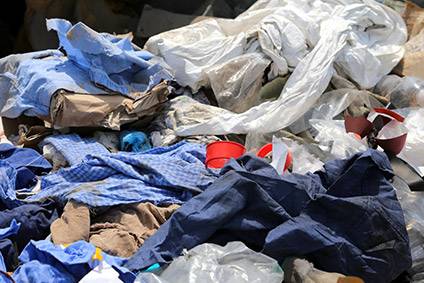
The UK government is being urged to ramp up its review of the Extended Producer Responsibility (EPR) on clothing and textiles, bringing it forward by three years.
In a position paper on the issue, the Textile Recycling Association has cited the “huge environmental and social impacts associated with the UK’s clothing supply chain” which it said make the case for completing the review at the earliest opportunity “compelling and absolutely necessary.”
It wants the EPR review completed by 2022 instead of an earlier suggested 2025 which it said is too long given the rapidly growing competition from China and elsewhere to supply markets willing to take used clothes.
The EPR is a strategy to add all of the environmental costs associated with a product throughout the product life cycle to the market price of that product. The UK Government, in its publication ‘Our Waste, Our Resources, A Strategy for England 2018’, has committed to invoking the “polluter pay” principle and harness the potential of EPR. It has identified five priority material streams for consideration under this commitment including textiles.
As part of this, the Textile Recycling Association noted the Government has stated that “by the end of 2025 we will have reviewed and consulted on measures such as Extended Producer Responsibility and product standards for five new waste streams, two of which we plan to complete by 2022.”
“The need to address the industry’s impact on climate change, water pollution, water scarcity, human health and its contribution to the issue of micro-plastics is of paramount importance,” the Textile Recycling Association said.
“Once this review has taken place, only then will the UK be in the best position to make a decision on whether Extended Producer Responsibility on clothing and textiles is a suitable proposal for the UK.”
In its position paper, which was published earlier this month, the body cites eight key issues it believes will be necessary to address in order to deliver a robust and comprehensive EPR framework, that would deliver substantial sustainable improvements across the clothing supply chain and a truly circular economy for the clothing and textile industry.
- Setting clear aims and objectives. Including targets to reduce consumption and increase re-use. This includes deciding which items are actually “in scope” and which could be covered by the EPR scheme – e.g. should it include clothing, other textile products, footwear, bags, accessories, etc?
- Ensuring businesses that are responsible for putting clothing and other “in-scope” products onto the market should bear the full cost of managing the impact of their product on human health and the environment. This includes invoking the “Polluter Pays Principle”.
- Delivering better, more sustainable textile products that consume less resources and are easier to recycle. This can include financial incentives to put more sustainable products on the market.
- Engaging the consumer in the EPR scheme. This can include requiring retailers to state how much levy has been placed on each “in-scope” product at the point of sale and funding of an ongoing communication campaign to help consumers make more sustainable choices.
- Ensuring that all businesses that are responsible putting “in-scope” clothing and other products onto the market contribute.
- Requiring all collection, sorting and recycling businesses to be audited in order to qualify as approved recipients of fees. Such requirements are vital so as to instil confidence amongst clothing producers and other supply chain stakeholders that payments are only going to legitimate re-use and recycling stakeholders and that the costs being charged by end of life partners are fair and proportionate
- Implementing robust administration of an EPR scheme for clothing and textiles. To have a single body responsible for administering an EPR scheme for clothing and textiles would seem eminently sensible and the best way to ensure consistency in the way EPR is applied.
- Complementing other policy measures and business models. A future EPR scheme should seek to complement other policy measures/initiatives that seek to deliver improvements in the clothing and textile supply chain.
This could include the implementation of eco-design principles for clothing or alternative business models such as clothing rental services.
“Many people are not aware of the huge environmental and social impacts of clothing production. The sector as a whole is responsible for around 10% of all global greenhouse gas emission. It is also a huge consumer of scarce freshwater on a scale that many would not believe and about 20% of all industrial water pollution is as a result of textile dyeing and finishing,” said Alan Wheeler director of the Textile Recycling Association.
“The existing fashion industry model of take, make, use and dump needs to be overhauled now into a radical and new circular economy for the fashion industry. What we are proposing is a starting point from which the whole sector can seek to build a fair an equitable EPR framework, that should not only benefit everyone involved in the entire supply chain, but in the wider global society and environment.”
Click here to access the position paper in full.



